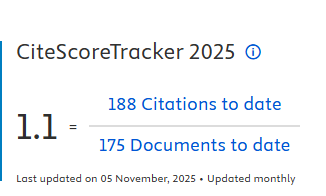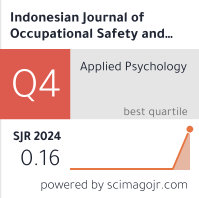Correlation between Individual Characteristics, Work Monotony, and Mental Workload with Work Stress
Downloads
Introduction: Work stress is the inability of a worker to face job demands, leading to discomfort while working. Work stress can be caused by many factors, among them work monotony, excessive workload, and individual characteristics. This study's aim was to analyze the strength of the relationship among individual characteristics, work monotony, and mental workload with work stress on the crane operators of Jamrud Terminal. Methods: This study used cross-sectional design. The population in this study was all crane operators in Jamrud Terminal as many as 28 people. Total sampling was applied as sampling technique. The independent variables in this study include individual characteristics (age and tenure), work monotony obtained from the questionnaire, mental workload which was appraised using NASA-TLX questionnaire, while the dependent variable was work stress assessed with DASS 42 questionnaire. Coefficient contingency and Spearman correlation test were applied to analyze collected data. Results: This study revealed 13 operators (46.4%) felt normal work stress and the other operators (53.6%) felt work stress ranging from light until very heavy. Contingency coefficient correlation test resulted in weak relationship among age and work stress and strong relationship among work monotony and work stress. Spearman correlation test revealed weak relationship among tenure and work stress and moderate relationship among mental workload and work stress. Conclusion: There were relationships among work monotony and mental workload with work stress on crane operators. The company is advised to give work music, variation on work, and arrange proper break time for crane operator.
Amalia, N. R., Wahyuni, I. and Ekawati (2017) ‘Hubungan Postur Kerja dengan Keluhan Kelelahan Kerja pada Operator Container Crane PT. Terminal Peti Kemas Semarang', Jurnal Kesehatan Masyarakat (e-Journal), 5(5), pp. 290–298.
Anoraga, P. (2016) Psikologi Kerja. Jakarta: Rineka Cipta.
Ardiyanti, N. et al. (2017) ‘Hubungan Beban Kerja Mental dengan Kelelahan Kerja pada Tenaga Keperawatan dan Tenaga Kebidanan di Puskesmas Mlati II Sleman Yogyakarta', Jurnal Kesehatan Masyarakat (e-Journal), 5(5), pp. 264–273.
Arini, S. Y. and Dwiyanti, E. (2017) ‘Analisis Faktor yang Berhubungan dengan Terjadinya Kelelahan Kerja pada Pengumpul Tol di Perusahaan Pengembang Jalan Tol Surabaya', The Indonesian Journal of Occupational Safety and Health, 4(2), pp. 113–122.
Baek, K. et al. (2018) ‘The Association of Workplace Psychosocial Factors and Musculoskeletal Pain Among Korean Emotional Laborers', Safety and Health at Work, 9(2), pp. 216–223.
Candraditya, R. (2016) Hubungan Tingkat Kebisingan dengan Stress Kerja pada Pekerja di PT. Vale Indonesia. Undergraduate Thesis. Surabaya: Faculty of Public Health Universitas Airlangga.
Diniari, H. R. (2019) Hubungan Paparan Kebisingan dan Beban Kerja dengan Stres Kerja pada Pekerja di Unit Circulator Loom PT. Kerta Rajasa Raya. Undergraduate Thesis. Surabaya: Faculty of Public Health Universitas Airlangga.
Fahamsyah, D. (2017) ‘Analisis Hubungan Kerja Mental dengan Stres Kerja', The Indonesian Journal of Occupational Safety and Health, 6(1), pp. 107–115.
Fitri, E. W., Titis, H. and Widodo, S. A. (2017) ‘Hubungan Antara Tingkat Stres Dengan Tingkat Insomnia Mahasiswa/I Angkatan 2012/2013 Program Studi Pendidikan Dokter Fakultas Kedokteran Universitas Diponegoro', Jurnal Kedokteran Diponegoro, 6(2), pp. 549–557.
Habibi, E., Taheri, M. R. and Hasanzadeh, A. (2015) ‘Relationship between Mental Workload and Musculoskeletal Disorders among Alzahra Hospital Nurses', Iranian Journal of Nursing and Midwifery Research, 20(1), pp. 1–6.
Haryanto, S., Septiari, R. and Rofieq, M. (2020) ‘Analisis Tingkat Kelelahan Pada Pembatik Batik Tulis Menggunakan SOFI (Swedish Occupational Fatigue Index)', Journal of Industrial View, 2(2), pp. 29–35.
Health Safety Executive (2019) Work-Related Stress, Anxiety or Depression Statistics in Great Britain, 2019, Annual Statistics.
Hou, X. et al. (2015) ‘CogniMeter: EEG-based Emotion, Mental Workload and Stress Visual Monitoring', 2015 International Conference on Cyberworlds (CW), pp. 153–160.
International Labour Organization (2016) Workplace Stress: a collective challenge, International Labour Organization (ILO).
Kusman, A. (2019) Analisis Beban Kerja Mental terhadap Operator Crane dan Rigger dengan Menggunakan Metode Nasa-TLX (Studi Kasus: PT. Sinar Samudera Abadi). Undergraduate Thesis. Bandung: Faculty of Engineering Universitas Pasundan.
Laura, N. C. S., Widjasena, B. and Jayanti, S. (2017) ‘Hubungan Beban Kerja Mental dan Shift Kerja terhadap Stres Kerja pada Pekerja Checker PT. Indofood CBP Sukses Makmur, TBK Palembang', Jurnal Kesehatan Masyarakat (e-Journal), 5(5), pp. 239–245.
Li, Y. et al. (2019) ‘The Status of Occupational Stress and Its Influence The Quality of Life of Copper-Nickel Miners in Xinjiang, China', International Journal of Environmental Research and Public Health, 16(3).
Lina, H. P. (2016) Analysis of Work Stress and Its Relationship with Job Factors at Container Crane (CC) Operators PT. Pelindo III (Persero) Tanjung Perak Branch. Undergraduate Thesis. Surabaya: Faculty of Public Health Universitas Airlangga.
Liu, X., Zhang, B. and Zhang, Z. (2020) ‘Leveraging Organizational Tenure to Improve Service Performance: The Role of Relational Coordination among Frontline Service Workers in China', Asia Pacific Business Review, 00(00), pp. 1–20.
Marliani, R. (2018) Psikologi Industri & Organisasi. Bandung: PUSTAKA SETIA.
Ministry of Health Republic of Indonesia (2018) Riset Kesehatan Dasar (Riskesdas) 2018, Riset Kesehatan Dasar. Jakarta: Ministry of Health Republic of Indonesia.
Ministry of Manpower and Transmigration Republic of Indonesia (2020) Peraturan Menteri Ketenagakerjaan Republik Indonesia Nomor 8 Tahun 2020 tentang Keselamatan dan Kesehatan Kerja Pesawat Angkat dan Angkut. Jakarta: Ministry of Manpower and Transmigration Republic of Indonesia.
Munandar, A. S. (2020) Psikologi Industri dan Organisasi. Jakarta: UI-Press.
Okeafor, C. U. and Alamina, F. E. (2018) ‘A Qualitative Study on Psychosocial Hazards Among Health Care Workers in a Tertiary Health Facility in South-South Nigeria', Annals of Ibadan Postgraduate Medicine, 16(1), pp. 23–29.
Pelindo III (2015) Press Release: Pelindo III Sertifikasi Operator Container Crane.
Pelindo III (2018) Arus Petikemas Pelindo III Naik 8,5 Persen.
Perwitasari, D. and Tualeka, A. R. (2018) ‘Faktor yang Berhubungan dengan Kelelahan Kerja Subyektif pada Perawat di RSUD dr. Mohamad Soewandhie Surabaya', The Indonesian Journal of Occupational Safety and Health, 6(3), pp. 15–23.
Sugiharto, F. M. (2019) ‘The Relationship between Mental Workload and Occupational Stress among Aircraft Maintenance Officers at PT X', The Indonesian Journal of Occupational Safety and Health, 8(2), pp. 233–239.
Febriani, K. D. (2018) Hubungan Shift Kerja Dengan Tingkat Kelelahan Kerja Pada Operator Container Crane (CC) di PT. Terminal Petikemas Surabaya Jawa Timur. D3 Thesis. Surakarta: Faculty of Medicine Universitas Sebelas Maret.
Susanty, N. A. (2019) Hubungan Beban dan Rutinitas Kerja Monoton dengan Stres Kerja Pekerja Pabrik Kasur. Undergraduate Thesis. Jakarta: Faculty of Medicine Universitas Trisakti.
Tarwaka (2016) Dasar-Dasar Keselamatan Kerja serta Pencegahan Kecelakaan di Tempat Kerja. Surakarta: Harapan Press.
Tarwaka (2019) Ergonomi Industri : Dasar-Dasar Pengetahuan Ergonomi dan Aplikasi di Tempat Kerja. 2nd edn. Surakarta: Harapan Offset.
Van Acker, B. B. et al. (2018) ‘Understanding Mental Workload: From A Clarifying Concept Analysis Toward An Implementable Framework', Cognition, Technology and Work, 20(3), pp. 351–365.
Verawati, L. (2017) ‘Hubungan Tingkat Kelelahan Subjektif dengan Produktivitas pada Tenaga Kerja Bagian Pengemasan di CV Sumber Barokah', The Indonesian Journal of Occupational Safety and Health, 5(1), pp. 51–60.
World Health Organization (2020) Occupational Health: Stress at The Workplace.
Copyright (c) 2023 The Indonesian Journal Of Occupational Safety and Health

This work is licensed under a Creative Commons Attribution-NonCommercial-ShareAlike 4.0 International License.

In order to be accepted and published by The Indonesian Journal of Occupational Safety and Health, Author(s) who submit an article should complete all the review process. The copyright of received articles assigned to the The Indonesian Journal of Occupational Safety and Health and Department of Safety and Health, Universitas Airlangga as publishers of the journal. The intended copyright includes the rights to publish articles in various forms (including reprints).
The Editorial Team of The Indonesian Journal Of Occupational Safety and Health and Department of Safety and Health strive to ensure that no errors occur in the articles that have been published, both data errors and statements in the article.
Users of this website will be licensed to use materials from this website following the Creative Commons Attribution-NonCommercial-ShareAlike 4.0 International License. No fees charged. Please use the materials accordingly.
------------------------------------------------------------------------------------------------------------------------------------------------------------------------------------------
Attribution ” You must give appropriate credit, provide a link to the license, and indicate if changes were made. You may do so in any reasonable manner, but not in any way that suggests the licensor endorses you or your use.
NonCommercial ” You may not use the material for commercial purposes.
ShareAlike ” If you remix, transform, or build upon the material, you must distribute your contributions under the same license as the original.







 How to Submit Articles in OJS
How to Submit Articles in OJS

























